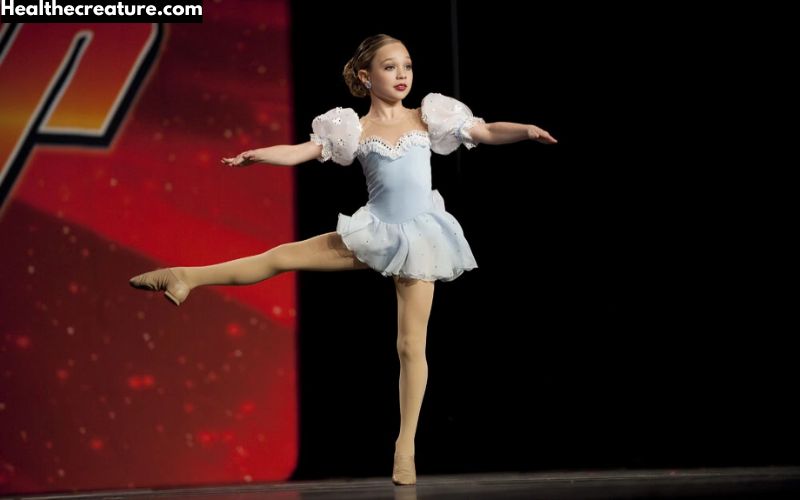Maddie Ziegler, an acclaimed dancer, actress, and model, rose to fame on the reality TV show Dance Moms. With her grace, talent, and determination, she has captured the hearts of millions worldwide. Despite her public prominence, there is no verifiable evidence or reports confirming that Maddie Ziegler has any diagnosed disease or chronic condition. However, her openness about mental health challenges and her role in portraying characters with medical conditions has sparked significant interest. This article delves into the topic comprehensively, exploring her health, advocacy, and representation of medical conditions in her artistic work.
Early Life and Rise to Fame
Born on September 30, 2002, in Pittsburgh, Pennsylvania, Maddie Ziegler began dancing at the tender age of two. Her natural aptitude for performance quickly became evident, and she joined the Abby Lee Dance Company, which later featured prominently on Dance Moms. This reality TV show showcased Maddie’s exceptional skills, often labeling her as the star performer. Her rigorous training schedule and the pressures of being a child prodigy may have contributed to a mentally taxing environment. Maddie’s ability to consistently deliver outstanding performances despite the intense competition made her a household name.
She gained further recognition when she collaborated with singer Sia in music videos such as “Chandelier” and “Elastic Heart,” showcasing her emotive and artistic abilities. These projects catapulted her to international fame, establishing her as a multifaceted talent. However, the relentless pursuit of excellence during her formative years undoubtedly shaped her mental and emotional resilience, preparing her for a career under constant public scrutiny. Despite the challenges of fame at a young age, Maddie used these experiences as a platform for growth and self-discovery, carving out a unique identity in the entertainment industry.
Maddie Ziegler and Mental Health Awareness
While Maddie Ziegler does not have a documented physical illness, she has openly discussed the psychological toll of her early fame. In interviews, Maddie has described the high-pressure environment on Dance Moms as “toxic.” She faced intense criticism, body shaming, and a relentless demand for perfection. These challenges left lasting impressions on her mental health, contributing to anxiety and self-doubt. Maddie’s ability to acknowledge and confront these struggles demonstrates her maturity and commitment to personal growth. Over the years, she has sought therapy to process her experiences and has become an advocate for mental health awareness.
Her decision to share her journey publicly has made her a relatable figure for fans and a beacon of hope for those grappling with similar issues. By emphasizing the importance of seeking help and practicing self-care, Maddie continues to inspire young people to prioritize their emotional well-being. Her advocacy has also encouraged open conversations about the impact of toxic environments on mental health, fostering a culture of empathy and understanding. Maddie’s story underscores the importance of addressing mental health challenges, particularly for individuals in high-pressure environments, and highlights the value of resilience and self-compassion.
Maddie Ziegler’s Artistic Exploration of Health Issues
Maddie’s acting career has seen her take on roles that explore significant health-related themes. In the film Fitting In, she portrays Lindy, a teenager diagnosed with Mayer-Rokitansky-Küster-Hauser (MRKH) syndrome. MRKH syndrome is a rare congenital condition that primarily affects the female reproductive system, leading to an underdeveloped or absent uterus and vagina. This role required Maddie to delve deep into the emotional complexities of living with a little-known medical condition. Her portrayal was lauded for its authenticity and sensitivity, shedding light on a condition that affects approximately one in 4,500 women. By taking on this role, Maddie helped raise awareness and fostered understanding of the challenges faced by those with MRKH syndrome.
Maddie’s ability to convey the emotional journey of her character demonstrated her growth as an actress and her dedication to meaningful storytelling. The project also served as an opportunity for Maddie to collaborate with experts and individuals affected by MRKH, ensuring an accurate and respectful representation. Through this role, she not only broadened her artistic horizons but also used her platform to bring visibility to a condition that often goes unrecognized. Her performance highlighted the importance of representation in media and underscored the power of storytelling in fostering empathy and awareness.
Understanding MRKH Syndrome
Mayer-Rokitansky-Küster-Hauser syndrome, often abbreviated as MRKH, is a congenital disorder affecting the development of the female reproductive tract. Women with this condition are typically born with normal external genitalia but may have an underdeveloped uterus and vagina. This condition often goes undiagnosed until adolescence when affected individuals fail to menstruate. MRKH can be classified into two types: Type I, which involves isolated abnormalities of the reproductive system, and Type II, which may also include anomalies in the kidneys, spine, or hearing. Although MRKH does not impact overall physical health or the ability to lead a normal life, it poses unique challenges, including infertility and emotional distress. Coping with the diagnosis often requires a multidisciplinary approach, involving gynecologists, psychologists, and support networks.
Medical interventions, such as reconstructive surgery or dilation therapy, can address physical aspects of the condition, while counseling helps manage emotional well-being. Awareness campaigns and media representation, such as Maddie Ziegler’s portrayal in Fitting In, play a crucial role in breaking the silence surrounding MRKH. By fostering understanding and empathy, these efforts empower individuals with the condition and encourage broader societal acceptance. The increased visibility of MRKH in popular media also highlights the importance of addressing the psychological and social aspects of living with rare medical conditions.
The Role of Dance in Maddie’s Life and Well-Being

Dance has been a cornerstone of Maddie Ziegler’s life, offering both challenges and solace. As a form of physical activity, dance promotes cardiovascular health, flexibility, and strength. For Maddie, it also served as an emotional outlet during her formative years. Dance allowed her to express herself creatively and provided a sense of purpose and structure amidst the chaos of fame. However, the intense demands of competitive dance can strain both the mind and body. Maddie has acknowledged the physical toll of rigorous training, including fatigue and minor injuries. Despite these challenges, dance remains a source of joy and self-expression for her.
Her performances often reflect her ability to channel emotions into movement, captivating audiences worldwide. Beyond the physical benefits, dance has been instrumental in Maddie’s personal growth and resilience. It taught her discipline, perseverance, and the importance of teamwork. These lessons have shaped her approach to life and her ability to navigate challenges with grace and determination. As Maddie continues to evolve as an artist, dance remains a vital part of her identity, reminding her of her roots and the transformative power of art.
Advocacy Through Art and Social Media
Beyond her performances, Maddie Ziegler leverages her platform to advocate for various causes, including mental health and body positivity. With millions of followers on social media, she uses her influence to promote messages of self-love and acceptance. By sharing glimpses of her personal journey, Maddie connects with fans on a deeper level, fostering a sense of community and support. Her advocacy extends to raising awareness about lesser-known medical conditions through her artistic projects. Whether it’s her portrayal of a character with MRKH syndrome or her discussions about mental health, Maddie’s contributions emphasize the importance of empathy and education.
Social media has also allowed Maddie to address misconceptions and challenge societal standards of beauty and success. By being authentic and vulnerable, she encourages others to embrace their individuality and celebrate their unique qualities. Maddie’s ability to use her platform for meaningful advocacy demonstrates her maturity and commitment to making a positive impact. Her efforts have not only enhanced her connection with her audience but have also inspired countless individuals to prioritize self-care and compassion. As she continues to grow, Maddie’s advocacy work remains a powerful testament to the influence of art and authenticity in driving social change.
Dispelling Misconceptions About Maddie Ziegler’s Health
The speculation surrounding Maddie Ziegler’s health highlights a broader issue: the public’s fascination with the personal lives of celebrities. It’s crucial to distinguish between roles portrayed by actors and their real-life circumstances. While Maddie’s character in Fitting In deals with MRKH syndrome, there is no evidence to suggest that Maddie herself has this condition or any other disease. This conflation underscores the need for responsible media consumption and critical thinking.
Speculation and rumors can perpetuate misinformation, detracting from the meaningful conversations Maddie’s work aims to inspire. By focusing on Maddie’s advocacy and artistic achievements, we can celebrate her contributions without perpetuating misinformation. Maddie’s openness about her experiences and her commitment to representing diverse perspectives in her work demonstrate her dedication to authenticity. By addressing these misconceptions, we can foster a more informed and respectful discourse, ensuring that Maddie’s efforts to raise awareness are recognized and appreciated.
Maddie Ziegler’s Continued Growth and Influence
As Maddie Ziegler transitions from a child prodigy to an accomplished artist, her influence continues to grow. She remains dedicated to using her platform for good, whether through her performances, advocacy work, or personal transparency. Her journey serves as an inspiration, illustrating the power of resilience and the importance of staying true to oneself. Maddie’s ability to navigate the challenges of fame while maintaining her authenticity has endeared her to fans and solidified her status as a role model.
Her commitment to raising awareness about health issues and promoting mental well-being underscores her desire to make a positive impact. By using her experiences as a foundation for growth, Maddie continues to evolve as an artist and advocate. In the years to come, her contributions will undoubtedly shape the cultural conversation around health and well-being, paving the way for meaningful change. Maddie’s journey exemplifies the importance of perseverance, empathy, and the transformative power of art, inspiring countless individuals to embrace their unique paths and make a difference in their own lives and communities.
See Also: What Disease Does Eric Clapton Have?
Conclusion
Maddie Ziegler’s story is one of talent, perseverance, and advocacy. While she does not have any known diseases, her openness about mental health challenges and her portrayal of characters with medical conditions highlight her dedication to fostering awareness and empathy. Through her work in dance, film, and social media, Maddie continues to inspire millions, proving that art and advocacy can go hand in hand. As she evolves as an artist and advocate, her contributions will undoubtedly shape the cultural conversation around health and well-being for years to come.


